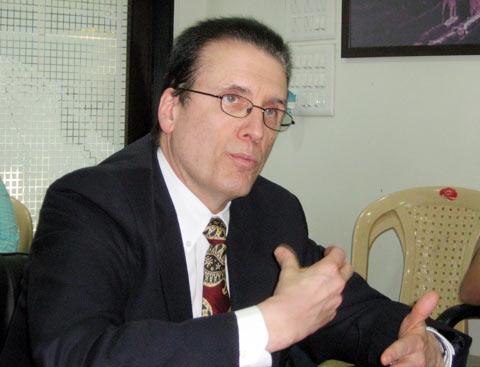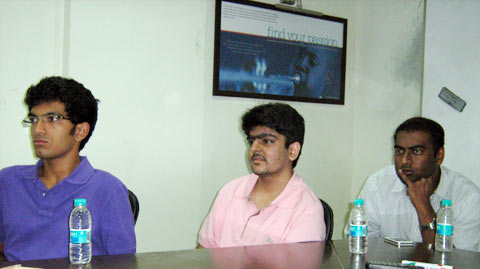Photographs: A Ganesh Nadar A Ganesh Nadar
A unique programme by Columbia Business School charges Rs 1,00,000 to train students for entrepreneurship in seven days.
Yes, that's what it costs to become an entrepreneur in a week. And you will be coached by American professors from Columbia University in the United States.
We are talking about In-V-Ent-Ed (Innovation-Venture Creation-Entrepreneurship-Education), a unique entrepreneurship-cum-innovation programme offered by the Columbia Business School in India, which aims to train budding entrepreneurs in a really short span of time.
If you think it's expensive, officials at the university will explain to you how it costs that much to travel to New York, stay there and study for seven days. Realistically speaking, it would work out to more than that, but with this programme you have the advantage of being trained in your home country without the added expenditure.
The course, which was launched in Delhi in October 2011, is also conducted in Kenya, the UAE, Turkey and China.
Dr Jack McGourty, Director of Community and Global Entrepreneurship at Columbia University is the creator of In-V-Ent-Ed. It targets students of all disciplines between classes nine and 12 and will be conducted in Mumbai during the summer vacation this year -- May/June 2012.
The daily schedule will see you attend from 9 am to 5 pm every day; the total number of hours put in is more than those offered in a one-month course at Columbia (approximately 33 hours).
You can apply for the course online at http://invented.futureworks.co.in/
Click NEXT to continue reading...
'30 per cent of all new ideas are about food'
Image: Students attend an In-V-Ent-Ed presentationParticipating students have to come up with a business idea and the course teaches them how to develop it.
"You should be passionate about the idea," says Kavita Singh, CEO of Futureworks Consulting, the university's partner in India. "If you are not passionate about it, then your work will suffer."
Once you present your idea, they teach you competitive strategy, which you can use to gain an edge over others in the same field.
Students who have taken the course in the past were made to do research and a lot of reading before formulating their own strategy.
Dr Gourty says, "Thirty per cent of all new ideas are about food. Two of my students in the US had food trucks. While one sold Korean barbeques, the other sold desserts around Wall Street." A third student came up with the proposal of turning used shipping containers into temporary homes, classrooms and hospitals in disaster-hit areas and another started a web portal for creative writing as part of the programme.
Why should people come to you and pay you?
Why is your concept better than others? Why should people come to you and pay you? These are some of the areas that students have to work on as part of the syllabus. The course also helps would-be entrepreneurs realise the significance of branding and teaches them to keep Intellectual Property Rights in mind.
Dr McGourty further elaborates upon a few things they teach aspiring entrepreneurs:
- A properly managed website is a must for any business.
- Proper pricing of products is equally important.
- Finances, inflow, outflow, expenses and profits have to be calculated for a period of three years.
- Sources of finance, cost of operations, growth and how to approach investors for funds are all part of the programme.
- Networking skills are very important for budding entrepreneurs. As an exercise, students are also taught how to network with fellow students across the globe as part of the course. "You have Skype to talk to anyone across the globe for free. This was not available to an earlier generation," says Dr McGourty.
The entrepreneurship programme claims to have a 1:25 teacher-student ratio.
Illustration: Uttam Ghosh
'Young people are naturally entrepreneurial'
For those who do not wish to pay one lakh for the programme, you can enter an online contest at http://invented.futureworks.co.in/contest.php to try and secure a seat.
Winning students can choose between a 50 percent scholarship for the In-V-Ent-Ed programme and a different venture-coaching course by the Columbia faculty, which costs Rs 50,000. Moreover, corporate professionals who sponsor students for the programme receive a concession. Entrepreneurship ideas across all fields are encouraged and it's not just for would-be businessmen or women; even those who are looking to establish social services may apply.
"Regional creative businesses are more likely to succeed. They create jobs locally, a fact which is worth appreciating," explains Dr McGourty. "Young people are naturally entrepreneurial. Even if you don't start your own business, multinational companies love employees who can innovate, who execute old ideas using new methods. You can add value to your company by associating with such programmes. You can also try out your business ideas using internships and/or summer jobs."
The In-V-Ent-Ed programme separates enrolled students into two batches -- one for high schoolers and the other for under-graduates. At the end of the course, the best-performing student in each batch will receive a prize worth 3,000 dollars. This prize is designed to help students take their entrepreneurial ideas forward and includes seed funding worth $1,000.
Illustration: Dominic Xavier
90 per cent of start-ups fail due to lack of planning
Dr McGourty also shares advice for young entrepreneurs.
"You must study the industry and analyse the market. Critical thinking, collaboration, innovation, research and core competency are a must for success," he explains.
"Our bigger vision is to support the entrepreneur. When you meet someone you should know the elevator pitch -- which means making the pitch before the elevator stops. Perseverance and good planning, followed by excellent execution will lead to success."
He warns that 90 per cent of start-ups fail, mainly due to a of lack of planning. "They don't study the business properly; they don't have a process, no plans and no focus. Structured process is a must. Plans should be well thought out and well implemented. When students ask for our help even after the course ends, we are always there for them," he signs off.
Illustration: Uttam Ghosh






Comment
article